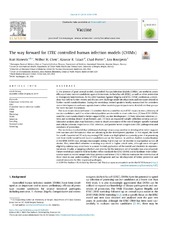| dc.contributor.author | Hanevik, Kurt | en_US |
| dc.contributor.author | Chen, Wilbur H. | en_US |
| dc.contributor.author | Talaat, Kawsar R. | en_US |
| dc.contributor.author | Porter, Chad | en_US |
| dc.contributor.author | Bourgeois, Lou | en_US |
| dc.date.accessioned | 2020-04-17T10:46:38Z | |
| dc.date.available | 2020-04-17T10:46:38Z | |
| dc.date.issued | 2019-01-29 | |
| dc.Published | Hanevik K, Chen, Talaat, Porter, Bourgeois. The way forward for ETEC controlled human infection models (CHIMs). Vaccine. 2019;37(34):4794-4799 | eng |
| dc.identifier.issn | 0264-410X | |
| dc.identifier.issn | 1873-2518 | |
| dc.identifier.uri | https://hdl.handle.net/1956/21914 | |
| dc.description.abstract | In the absence of good animal models, Controlled Human Infection Models (CHIMs) are useful to assess efficacy of new vaccine candidates against Enterotoxic Escherichia coli (ETEC), as well as other preventive or therapeutic interventions. At the 2018 Vaccines Against Shigella and ETEC (VASE) conference, a workshop was held to further review and discuss new challenge model developments and key issues related to further model standardization. During the workshop, invited speakers briefly summarized for attendees recent developments and main agenda issues before workshop participants were divided into four groups for more focused discussions. The main issues discussed were: (1) whether there is a need for more ETEC strains to test a diversity of vaccine candidates, and if so, what criteria/qualities are desirable in strain selection; (2) how ETEC CHIMs could be more standardized to better support ETEC vaccine development; (3) how volunteer selection criteria and screening should be performed, and; (4) how an expanded sample collection schema and collaborative analysis plan may facilitate a more in-depth assessment of the role of antigen-specific humoral and cellular immune responses in ETEC infection, and provide better insights into ETEC pathogenesis and correlates of protection. The workshop concluded that additional challenge strains may need to be developed to better support new vaccines and therapeutics that are advancing in the development pipeline. In this regard, the need for a well characterized ST-only expressing ETEC strain was highlighted as a priority given that promising new heat stable toxoid based vaccine candidates are on the horizon. In addition, further standardization of the ETEC CHIMs was strongly encouraged, noting that it may not be realistic to standardize across all strains. Also, intensified volunteer screening may result in higher attack rates, although more stringent eligibility criteria may contribute to a more limited application of the model and diminish its representativeness. Finally, a sampling schedule and priority list for minimum set of samples was also proposed. Future workshops could be held to further refine standards for ETEC CHIMS and to facilitate more collaborative work on stored sample sets from previous and future ETEC CHIMs to maximize the contribution of these trials to our understanding of ETEC pathogenesis and our development of better prevention and control measures for this important pathogen. | en_US |
| dc.language.iso | eng | eng |
| dc.publisher | Elsevier Ltd | eng |
| dc.rights | Attribution CC BY | eng |
| dc.rights.uri | https://creativecommons.org/licenses/by/4.0/ | eng |
| dc.subject | Enterotoxic Escherichia coli | eng |
| dc.subject | ETEC | eng |
| dc.subject | Controlled human infection models | eng |
| dc.subject | CHIM | eng |
| dc.subject | VASE | eng |
| dc.subject | Workshop | eng |
| dc.subject | Strain | eng |
| dc.subject | Selection | eng |
| dc.subject | Sampling | eng |
| dc.subject | Standardization | eng |
| dc.subject | Screening | eng |
| dc.title | The way forward for ETEC controlled human infection models (CHIMs) | en_US |
| dc.type | Peer reviewed | |
| dc.type | Journal article | |
| dc.date.updated | 2020-02-11T12:04:51Z | |
| dc.description.version | publishedVersion | en_US |
| dc.rights.holder | Copyright 2019 The Author(s) | |
| dc.identifier.doi | https://doi.org/10.1016/j.vaccine.2019.01.003 | |
| dc.identifier.cristin | 1693317 | |
| dc.source.journal | Vaccine | |

